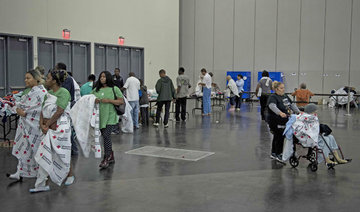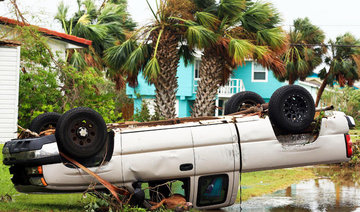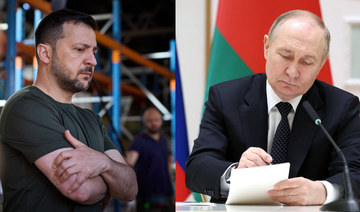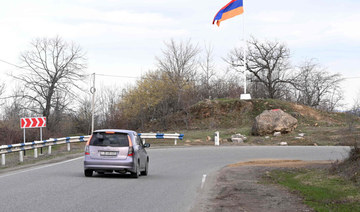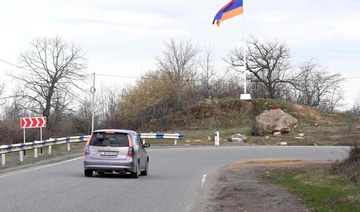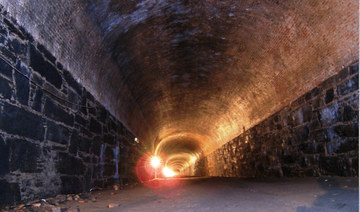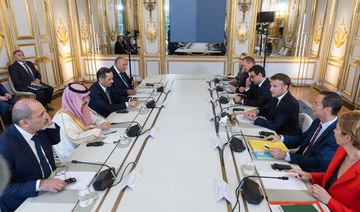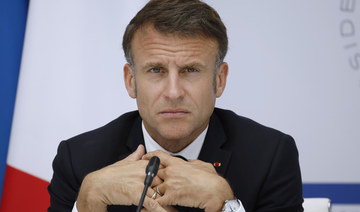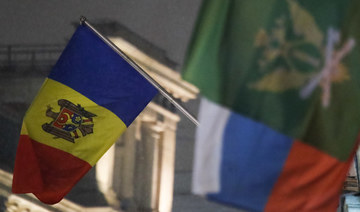WASHINGTON: US President Donald Trump has been showcasing the federal government’s response to Harvey on Twitter and praising the spirit of Texans as they cope with the storm.
Trump plans to visit the state on Tuesday.
In a series of tweets on Sunday, Trump said his administration was handling its responsibilities well and, in a tangential aside, hawked a book on race and crime in America written by a supporter.
“Wow — Now experts are calling #Harvey a once in 500 year flood! We have an all out effort going, and going well!“
Later, he added: “Even experts have said they’ve never seen one like this!” and “HISTORIC rainfall in Houston, and all over Texas. Floods are unprecedented, and more rain coming. Spirit of the people is incredible.Thanks!“
Harvey is the first major natural disaster of Trump’s presidency and a significant test for a White House that is often chaotic and rife with infighting. Attention on Harvey from officials, the public and the news media also allows Trump to refocus after a turbulent stretch that included his widely criticized response to the white nationalist protests in Charlottesville, Virginia.
Trump, who spent most of the weekend at the presidential retreat at Camp David, Maryland, convened a Cabinet meeting by telephone Sunday which included Vice President Mike Pence.
He tweeted a promise of a Texas visit “as soon as that trip can be made without causing disruption” — later announced by the White House as Tuesday.
Texas Gov. Greg Abbott loaded heavy praise on Trump and the federal government, describing an “A-plus” effort.
“I’ve got to tell you, I give FEMA a grade of A+, all the way from the president down,” Abbott said.
“I’ve spoken to the president several times, to his Cabinet members, such as secretary of homeland security, such as the administrator of FEMA, such as Tom Price, the secretary of health and human services.”
The devastating storm has dumped more than 2 feet of rain, sending thousands of people in Houston to rooftops for rescue and prompting a warning from Federal Emergency Management Agency director Brock Long of a “landmark event” that could require years to get damaged areas back on track.
“All across the board, from the White House to the federal administration to FEMA, they’ve been very helpful,” Abbott said.
Harvey made landfall along the Gulf Coast on Friday night as a Category 4 storm near Corpus Christi, and moved northeast along the Texas coast over Houston. Abbott said he expected heavy rain “for days to come.”
The governor commended Trump for being “extremely professional, very helpful” in moving quickly to grant his request Friday for an immediate disaster declaration, which triggers additional federal assistance to aggrieved areas.
Abbott said the focus was on rescue in the Houston area, citing multiple high-level vehicles sent in late Saturday night that were being manned by the National Guard, but that boats and helicopters will be available all across east Texas for swift water rescue. Still, in many areas, Houston officials were reporting flooding so widespread that rescuers were getting too many calls to respond to each one and had to prioritize life-and-death situations.
“We’re measuring rain these days not in inches but in feet,” Abbott said.
In his tweets, Trump praised Federal Emergency Management Agency Administrator Brock Long for “doing a great job” and touted the “great coordination between agencies at all levels of government.” He also tweeted Sunday morning about his Cabinet meeting to address Harvey. The Department of Homeland Security, which oversees FEMA, is currently without a secretary.
“Major rescue operations underway!” he wrote.
Trump’s tweets had their oddities and non-sequiturs. He also addressed the North America Free Trade agreement, the need for a wall along the US-Mexico border and tax cuts. Trump also found time to promote a book by Milwaukee County, Wisconsin, Sheriff David Clarke, a Trump supporter often on television discussing his conservative views of race, crime and law enforcement.
The White House released a summary of the Cabinet conference call, saying Trump “continued to stress his expectation that all departments and agencies stay fully committed to supporting the Governors of Texas and Louisiana and his number one priority of saving lives.”
The Trump administration efforts seek to offer a contrast to President George W. Bush’s response to Hurricane Katrina, which hit New Orleans in August 2005 and left more than 1,500 dead. The mismanaged response of Bush’s FEMA administrator, Michael Brown, to that hurricane, as well as Bush’s praise of Brown for doing a “heck of a job” in the immediate days after, dogged Bush for the rest of his presidency.
On Sunday, Long said FEMA is now “vastly different” than in 2005 and that he has the power he needs to mobilize forces and coordinate staffing. He said the agency was already preparing to handle the aftermath in Texas for the next couple of years.
“This disaster’s going to be a landmark event,” Long said. “While we’re focused on the response right now and helping Texas respond, we’re already pushing forward recovery housing teams, we’re already pushing forward forces to be on the ground to implement national flood insurance program polices as well and doing the inspections that we need.”
White House homeland security adviser Tom Bossert defended the early compliments between Trump and Abbott for the response to Harvey, citing the quick action to declare a disaster before landfall to get additional resources in place. But Bossert acknowledged the worst was yet to come, estimating “continued rain, upwards of 30 inches.”
“I’ve been around dozens and dozens of major disasters and hurricanes, hundreds of disasters. I’ve never seen 30 inches of rain,” he said. “We’re going to posture ourselves for the long-term care of the medical needy, of the elderly, of the weak and then we’ll put ourselves in the position to provide the resources to rebuild and recover,” he said.
Abbott spoke on ABC’s “This Week” and “Fox News Sunday,” Long appeared on CNN’s “State of the Union” and NBC’s “Meet the Press,” and Bossert was on ABC and CBS’ “Face the Nation.”
Trump praises spirit of Texans as they cope with Harvey
Trump praises spirit of Texans as they cope with Harvey
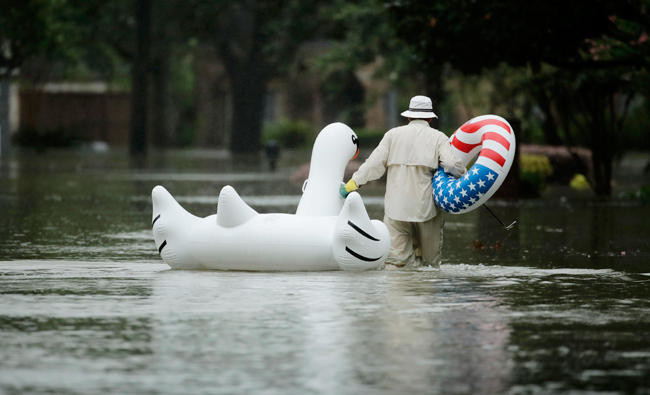
Putin arrives in Uzbekistan on his 3rd foreign trip since re-election
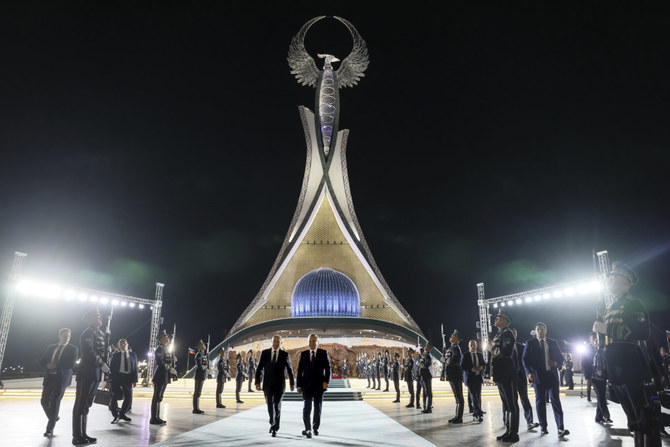
- The Kremlin leader has traveled abroad only infrequently since the start of Moscow’s invasion of Ukraine in February 2022
MOSCOW: Russian President Vladimir Putin arrived Sunday in the capital of Uzbekistan where he is to hold talks with President Shavkay Mirziyoyev that are expected to focus on deepening the countries’ relations.
Putin laid a wreath at a momument to Uzbekistan’s independence in Tashkent and held what the Kremlin said were informal talks with Mirziyoyev. The formal meeting of the presidents is to take place Monday.
Kremlin spokesman Dmitry Peskov, quoted by news agencies, told Russian television that Russia was open to broader cooperation on gas supplies with Uzbekistan, saying “the possibilities here are very extensive.”
The visit is Putin’s third foreign trip since being inaugurated for a fifth term in May. He first went to China, where he expressed appreciation for China’s proposals for talks to end the Ukraine conflict, and later to Belarus where Russia has deployed tactical nuclear weapons.
Ahead of the Uzbekistan trip, Putin and Mirziyoyev discussed an array of bilateral cooperation issues, including trade and economic relations, the Kremlin said.
The Kremlin leader has traveled abroad only infrequently since the start of Moscow’s invasion of Ukraine in February 2022.
The International Criminal Court issued a warrant for his arrest last March on suspicion of illegally deporting hundreds of children from Ukraine. The Kremlin denies those allegations.
Armenians throng center of the capital to demand the prime minister’s resignation
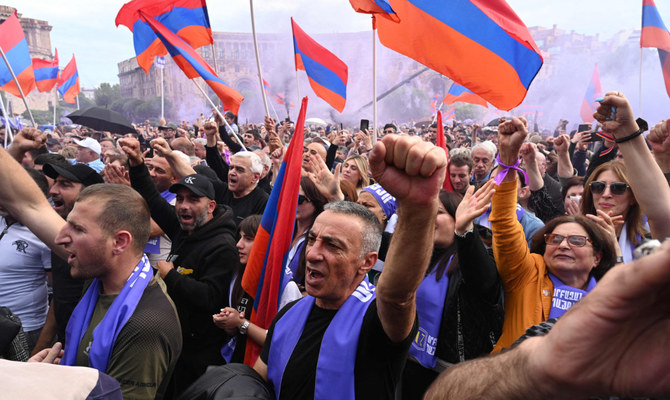
- Movement leaders told the rally Sunday that they support Galstanyan becoming the next prime minister
YEREVAN, Armenia: Tens of thousands of demonstrators held a protest Sunday in the center of the capital of Armenia, calling for the resignation of Prime Minister Nikol Pashinyan after Armenia agreed to hand over control of several border villages to Azerbaijan.
The demonstration was the latest in a weekslong series of gatherings led by a high-ranking cleric in the Armenian Apostolic Church, Bagrat Galstanyan, archbishop of the Tavush diocese in Armenia’s northeast.
He spearheaded the formation of a movement called Tavush For The Homeland after Armenia in April agreed to cede control of four villages in the region to Azerbaijan. Although the villages were the movement’s core issue, it has expanded to express a wide array of complaints about Pashinyan and his government.
Movement leaders told the rally Sunday that they support Galstanyan becoming the next prime minister.
The decision to turn over the villages in Tavush followed the lightning military campaign in September in which Azerbaijan’s military forced ethnic Armenian separatist authorities in the Karabakh region to capitulate.
After Azerbaijan took full control of Karabakh, about 120,000 people fled the region, almost all of its ethnic Armenian population.
Ethnic Armenian fighters backed by Armenian forces had taken control of Karabakh in 1994 at the end of a six-year war. Azerbaijan regained some of the territory in fighting in 2020 that ended in an armistice that brought in a Russian peacekeeper force, which began withdrawing this year.
Pashinyan has said Armenia needs to quickly define the border with Azerbaijan to avoid a new round of hostilities.
Man accused in fiery liquid attacks on New York City subway riders
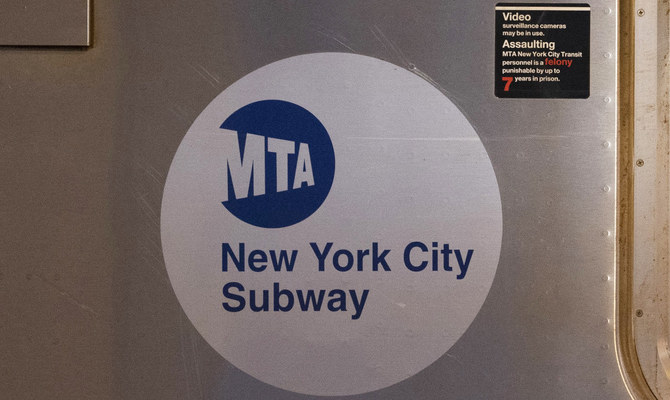
- While violent crime is rare in the city’s subway system, which serves about 3 million riders a day, some high-profile attacks this year have left some riders on edge
NEW YORK: A man set a cup of liquid on fire and tossed it at a fellow subway rider in New York City, setting the victim’s shirt ablaze and injuring him, police said Sunday.
The random attack happened on a No. 1 train in lower Manhattan on Saturday afternoon, city police said, adding that the suspect was in custody on an array of criminal charges. Authorities also charged the man in connection with a similar fiery assault on the subway in February.
The victim from Saturday, a 23-year-old man, was recovering at a hospital. He told the New York Post that he shielded his fiancee and cousin from the burning liquid and his shirt caught on fire. He said he slapped himself to put out the flames. Doctors told him he had burns on about a third of his body, he said.
“He had a cup,” the victim told the Post. “He made fire and he threw it all.”
While violent crime is rare in the city’s subway system, which serves about 3 million riders a day, some high-profile attacks this year have left some riders on edge. They include the death of a man who was shoved onto the tracks in East Harlem in March and a few shootings.
The suspect in Saturday’s assault, Nile Taylor, 49, was arrested a short time after it happened when police tracked a phone he allegedly stole from another subway rider to his location, authorities said. He was charged with assault, arson, illegal possession of a weapon and several other crimes.
It wasn’t immediately clear if Taylor had a lawyer who could respond to the allegations, or when he would be arraigned in court.
Authorities also announced on Sunday afternoon that Taylor was charged with attempted assault, reckless endangerment and arson in the February attack. Police say he threw a container with a flaming liquid at a group of people on a subway platform in the West 28th Street station. No one was injured.
Gov. Kathy Hochul in March announced that hundreds of National Guard members would be going into the subway system to boost security. City police said 800 more officers would be deployed to the subway to crack down on fare evasion.
Macron urges defense of democracy on state visit to Germany
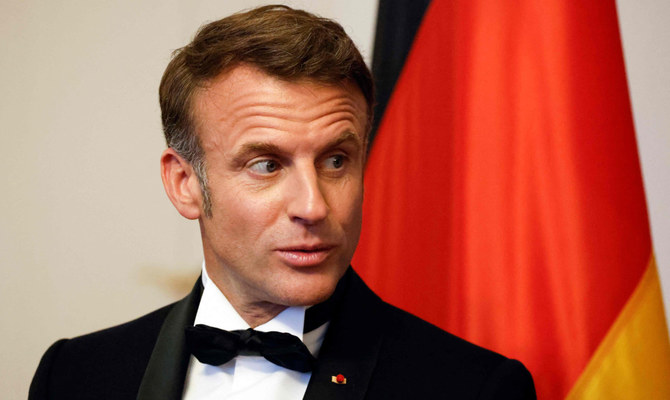
- Macron made his first stop a democracy festival in Berlin, where he warned of a “form of fascination for authoritarianism which is growing” in the two major EU nations
BERLIN: Emmanuel Macron began Sunday the first state visit to Germany by a French president in a quarter-century, bringing a plea to defend democracy against nationalism at coming European Parliament elections.
Macron made his first stop a democracy festival in Berlin, where he warned of a “form of fascination for authoritarianism which is growing” in the two major EU nations.
“We forget too often that it’s a fight” to protect democracy, Macron said, accompanied by German President Frank-Walter Steinmeier.
If nationalist parties had been in power in Europe in recent years, “history would not have been the same,” he said, pointing to decisions on the coronavirus pandemic or Russia’s invasion of Ukraine.
Steinmeier said: “We need an alliance of democrats in Europe.”
Macron “has rightly pointed out that the conditions today before the European elections are different from the previous election, a lot has happened,” he added.
The trip comes two weeks ahead of European Union elections in which polls are indicating a major potential embarrassment for Macron, with his centrist coalition trailing behind the far right.
It could even struggle to reach a third-place finish.
In Germany too, all three parties in Chancellor Olaf Scholz’s coalition are polling behind the far-right AfD in surveys, despite a series of scandals embroiling the anti-immigration party.
At a press conference, Macron said he would work to “unmask” France’s far-right National Rally (RN), saying that “nothing in their rhetoric holds water.”
“Unlike many, I’m not getting used to the idea that the National Rally is just another party. And so when it’s at the top of the surveys, I see this party and its ideas as a threat to Europe,” he said.
In a keynote address on foreign policy last month, Macron warned about the threats to Europe in the wake of Russia’s 2022 invasion of Ukraine.
“Our Europe, today, is mortal and it can die,” he said. “It can die, and this depends only on our choices.”
Ramping up his warning in Berlin, Macron urged Europeans “to go vote for the party that we back and a party that defends Europe.”
Hosting a state banquet later Sunday for Macron, Steinmeier also referred to the threat posed by Russia.
“Together we must learn again to better protect ourselves against aggressors, and to make our societies more resilient against attacks from within and without,” he said.
After the talks with Steinmeier, Macron is due to bring his message to Dresden in the former East German state of Saxony, where the AfD has a strong support base.
On Tuesday, Macron will visit the western German city of Munster and later Meseberg, outside Berlin, for talks with Scholz and a joint Franco-German cabinet meeting.
Beyond making joint appeals for the European elections, Macron’s three-day visit will seek to emphasize the historic importance of the postwar relationship between the key EU states.
France next month commemorates 80 years since the D-Day landings that marked the beginning of the end of Nazi Germany’s World War II occupation.
But all has not been smooth in a relationship often seen as the engine of the EU, and German officials are said to be uneasy at times about Macron’s perceived theatrical style of foreign policy.
Macron’s refusal to rule out sending troops to Ukraine sparked an unusually acidic response from Scholz that Germany had no such plans. Germany also does not share Macron’s enthusiasm for a European strategic autonomy less dependent on the United States.
But Macron sought to dismiss talk about discord, saying that coordination with Germany had been key over the years.
He cited agreements on sanctions against Russia over its war on Ukraine and action to spur European economic growth and innovation after the Covid pandemic.
“The Franco-German relationship is about disagreeing and trying to find ways of compromise,” said Helene Miard-Delacroix, specialist in German history at the Sorbonne university in Paris.
While Macron is a frequent visitor to Berlin, the trip is the first state visit in 24 years, since a trip by Jacques Chirac in 2000, and the sixth since the first postwar state visit by Charles de Gaulle in 1962.
Lithuania’s President Nauseda re-elected in vote marked by Russia fears
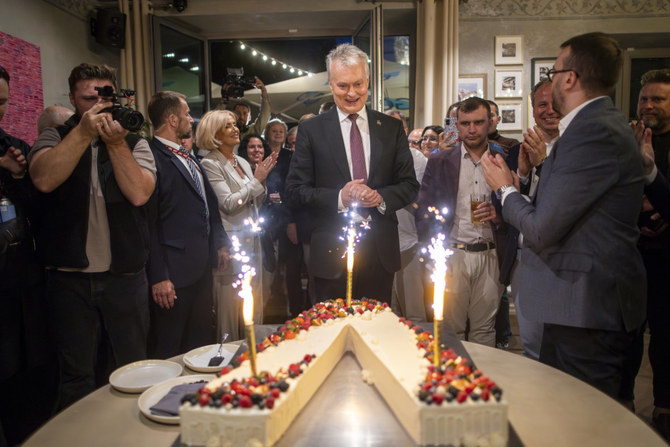
- Electoral commission count showed that Nauseda won 76 percent of votes with 80 percent of ballots counted after polls closed
- Electoral commission count showed that Nauseda won 76 percent of votes with 80 percent of ballots counted after polls closed
VILNIUS: Lithuania’s President Gitanas Nauseda won re-election on Sunday in a vote marked by defense concerns over neighboring Russia, official results showed.
The count published by the electoral commission showed that Nauseda won 76 percent of votes with 80 percent of ballots counted after polls closed in the second-round vote.
Voters “have handed me a great mandate of trust and I am well aware that I will have to cherish this,” Nauseda, 60, told journalists in Vilnius.
“Now that I have five years of experience, I believe that I will certainly be able to use this jewel properly, first of all to achieve the goals of welfare for all the people of Lithuania,” he said.
His opponent, Prime Minister Ingrida Simonyte, conceded defeat in comments to reporters and congratulated Nauseda.
The Lithuanian president steers defense and foreign policy, attending EU and NATO summits, but must consult with the government and parliament on appointing the most senior officials.
While the candidates agree on defense, they share diverging views on Lithuania’s relations with China, which have been strained for years over Taiwan.
Both candidates agree that the NATO and EU member of 2.8 million people should boost defense spending to counter the perceived threat from Russia, and to that end the government recently proposed a tax increase.
Vilnius fears it could be next in the crosshairs if Moscow were to win its war against Ukraine.
Lithuania is a significant donor to Ukraine, which has been battling Russia since the 2022 invasion. It is already a big defense spender, with a military budget equal to 2.75 percent of GDP.
It intends to purchase tanks and additional air defense systems, and to host a German brigade, as Berlin plans to complete the stationing of around 5,000 troops by 2027.
Pensioner Ausra Vysniauskiene said she voted for Nauseda.
“He’s an intelligent man, he speaks many languages, he’s educated, he’s a banker,” the 67-year-old told AFP.
“I want men to lead, especially when the threat of war is so big.”
Simonyte, the 49-year-old candidate of the ruling conservatives, was running for president again after losing to Nauseda in the last presidential ballot.
The uneasy relationship between Nauseda and Simonyte’s conservatives has at times triggered foreign policy debates, most notably on Lithuania’s relations with China.
Bilateral ties turned tense in 2021, when Vilnius allowed Taiwan to open a de facto embassy under the island’s name — a departure from the common diplomatic practice of using the name of the capital Taipei to avoid angering Beijing.
China, which considers self-ruled Taiwan a part of its territory, downgraded diplomatic relations with Vilnius and blocked its exports, leading some Lithuanian politicians to urge a restoration of relations for the sake of the economy.
Nauseda sees the need to change the name of the representative office, while Simonyte pushed back against it.
But voters also cited personal differences between the candidates, as well as economic policy and human rights.
Simonyte drew support from liberal voters in bigger cities and traditional conservative voters.
A fiscal conservative with liberal views on social issues, she notably supports same-sex partnerships, a controversial issue in the predominantly Catholic country.
“I would like to see faster progress, more openness... more tolerance for people who are different from us,” she said when casting an early vote.
Nauseda, who maintains a moderate stance on nearly all issues, has established himself as a promoter of the welfare state, with conservative views on gay rights.


